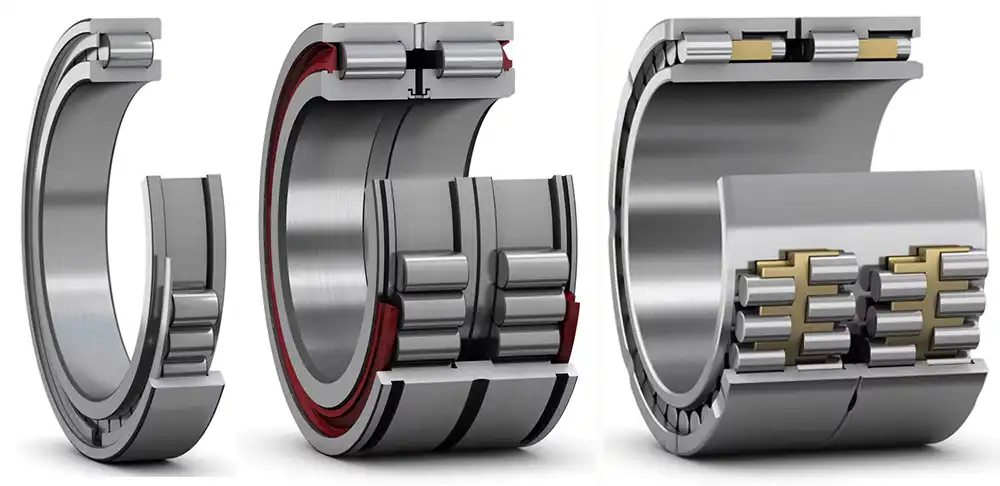Can Full Complement Cylindrical Roller Bearings Handle Heavy Loads?
Full complement cylindrical roller bearings are specifically designed to excel in applications requiring exceptional load-carrying capacity. Unlike traditional roller bearings with cages, these bearings maximize the number of rolling elements, allowing them to distribute heavy radial loads more effectively. This design makes them ideal for industries where machinery operates under extreme stress and demanding conditions. Whether it’s supporting massive equipment in mining operations or ensuring smooth performance in wind turbines, full complement cylindrical roller bearings have proven their ability to handle heavy loads with reliability. In this blog, we will explore how these bearings achieve their superior load-handling capabilities, their suitability for various high-load applications, and the factors that contribute to their durability.

How do Full Complement Cylindrical Roller Bearings achieve high load capacity?
Increased Rolling Element Density
The absence of a cage in full complement cylindrical roller bearings allows for an increased number of rolling elements within the bearing assembly. This higher density of rollers significantly enhances the load-carrying capacity of the bearing. Full complement cylindrical roller bearings are particularly effective in applications such as large gearboxes and industrial presses, where static and dynamic radial loads are substantial. The additional rollers distribute the load more evenly across the bearing surface, reducing stress concentrations and minimizing the risk of premature failure. This design feature ensures that the bearing can operate efficiently even under continuous heavy loading, making it a preferred choice for industries requiring robust performance.
Optimized Load Distribution
Another key factor contributing to the high load capacity of full complement cylindrical roller bearings is their optimized load distribution. The geometry of the rollers and raceways is carefully engineered to ensure uniform contact between the rolling elements and bearing surfaces. This reduces localized wear and prevents deformation under heavy loads. For example, in steel rolling mills, full complement cylindrical roller bearings are used in roll necks to support the immense forces generated during the rolling process. Their ability to maintain consistent load distribution ensures stable operation and extends the service life of the machinery. This level of precision engineering makes these bearings indispensable in heavy-load environments.

Enhanced Structural Integrity
The structural integrity of full complement cylindrical roller bearings is another critical aspect of their ability to handle heavy loads. These bearings are constructed using high-quality materials, such as hardened steel, which provide excellent resistance to fatigue and deformation. For instance, in mining equipment like crushers and conveyor systems, full complement cylindrical roller bearings endure constant exposure to abrasive materials and high radial forces. Their robust construction ensures that they can withstand these conditions without compromising performance. By maintaining their structural integrity over time, these bearings contribute to the overall reliability and efficiency of heavy machinery.
What applications benefit most from Full Complement Cylindrical Roller Bearings?
Heavy Machinery in Construction
Full complement cylindrical roller bearings are widely used in heavy machinery within the construction industry, where they play a vital role in supporting large radial loads. Equipment such as excavators, bulldozers, and cranes rely on these bearings to ensure smooth and reliable operation. Full complement cylindrical roller bearings are often found in the rotating components of these machines, such as slewing rings and gearboxes, where their high load capacity is essential. Their ability to withstand harsh environmental conditions, including dust and debris, further enhances their suitability for construction applications. By providing consistent performance under heavy loads, these bearings help minimize downtime and maintenance costs, improving overall productivity.
Wind Turbine Gearboxes
The renewable energy sector, particularly wind energy, benefits greatly from the use of full complement cylindrical roller bearings in turbine gearboxes. These bearings are responsible for supporting the rotor shaft and handling the significant radial loads generated by wind forces. Full complement cylindrical roller bearings are ideal for this application due to their ability to operate reliably under variable load conditions and high rotational speeds. Their robust design ensures minimal wear and tear, even in remote installations like offshore wind farms. By enhancing the efficiency and longevity of wind turbines, these bearings contribute to the sustainability and reliability of renewable energy solutions.
Mining and Material Handling Equipment
In the mining and material handling industries, full complement cylindrical roller bearings are essential for equipment such as conveyor systems, crushers, and vibrating screens. These industries demand bearings that can handle extreme conditions, including heavy loads, abrasive materials, and continuous operation. Full complement cylindrical roller bearings meet these requirements by offering superior load-carrying capacity and resistance to fatigue. For example, in conveyor rollers, these bearings ensure smooth and efficient material transport by reducing friction and wear. Their durability also makes them suitable for underground mining operations, where reliability is crucial. By using full complement cylindrical roller bearings, mining companies can enhance the performance and longevity of their equipment, ultimately reducing operational costs.
What factors contribute to the durability of Full Complement Cylindrical Roller Bearings?
High-Quality Materials
The durability of full complement cylindrical roller bearings is largely attributed to the use of high-quality materials in their construction. These bearings are typically manufactured using alloy steels that are heat-treated to achieve optimal hardness and toughness. This ensures that the bearings can resist wear and fatigue, even when subjected to heavy loads and harsh operating conditions. For example, in the oil and gas industry, full complement cylindrical roller bearings are used in drilling equipment, where they must endure abrasive drilling fluids and high temperatures. The superior material properties of these bearings make them a reliable choice for demanding applications, ensuring long service life and consistent performance.
Advanced Lubrication Systems
Effective lubrication is another critical factor that enhances the durability of full complement cylindrical roller bearings. Proper lubrication reduces friction between the rolling elements and raceways, preventing overheating and wear. Many industries, such as power generation and transportation, rely on advanced lubrication systems to maintain the performance of these bearings. For instance, in railway axleboxes, full complement cylindrical roller bearings are paired with specialized lubricants that provide long-lasting protection under high-speed and heavy-load conditions. By ensuring consistent lubrication, operators can extend the service life of the bearings and minimize the need for frequent maintenance.
Precision Manufacturing Techniques
Precision manufacturing techniques play a vital role in the durability of full complement cylindrical roller bearings. These bearings are produced using state-of-the-art equipment and processes that ensure tight tolerances and high accuracy. For example, in aerospace applications, full complement cylindrical roller bearings are used in landing gear systems, where their dimensional precision is critical for safe and reliable operation. The rigorous quality control measures employed during manufacturing ensure that each bearing meets the highest standards of performance and reliability. By combining advanced manufacturing techniques with high-quality materials, manufacturers can produce bearings capable of withstanding the most challenging conditions.
Conclusion
Full complement cylindrical roller bearings are unmatched in their ability to handle heavy loads, thanks to their unique design, durable materials, and precision engineering. These bearings excel in a wide range of applications, from construction and mining to wind energy and transportation, offering reliability and efficiency under demanding conditions. Their enhanced load capacity, optimized load distribution, and robust construction make them indispensable for industries requiring sustained performance.
Luoyang Huigong Bearing Technology Co., Ltd. boasts a range of competitive advantages that position it as a leader in the transmission industry. Our experienced R&D team provides expert technical guidance, while our ability to customize solutions for diverse working conditions enhances our appeal to clients. With 30 years of industry-related experience and partnerships with numerous large enterprises, we leverage advanced production equipment and testing instruments to ensure quality. Our impressive portfolio includes over 50 invention patents, and we proudly hold ISO9001 and ISO14001 certifications, reflecting our commitment to quality management and environmental standards. Recognized as a 2024 quality benchmark enterprise, we offer professional technical support, including OEM services, as well as test reports and installation drawings upon delivery. Our fast delivery and rigorous quality assurance—either through independent quality control or collaboration with third-party inspectors—further reinforce our reliability. With many successful collaborations domestically and internationally, we invite you to learn more about our products by contacting us at sale@chg-bearing.com or calling our hotline at +86-0379-65793878.
References
1. Harris, T. A., & Kotzalas, M. N. (2019). Essential Concepts of Bearing Technology. CRC Press.
2. SKF Group. (2020). Bearing Types and Applications. SKF Publications.
3. Timken Company. (2018). Cylindrical Roller Bearings Catalogue. Timken Co.
4. Shigley, J. E., & Mischke, C. R. (2016). Mechanical Engineering Design. McGraw-Hill Education.
5. Machinery’s Handbook. (2021). Bearings and Their Industrial Uses. Industrial Press Inc.
6. Jones, A. B. (2017). Rolling Element Bearings: Principles and Applications. Elsevier.

